Why Did Valmiki Maharshi Approach Sage Narada For Guidance?
Listen to the audio above
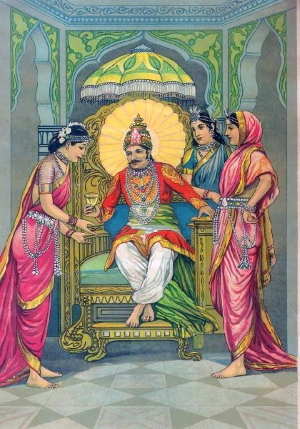
Transcript
(Click here to read more)
Valmiki Maharshi when he wanted to write Ramayana.. Why did he want to write Ramayana? Because principles of virtuous living were scattered across thousands of scriptures. Moreover, the examples shown, they are not about the same person. Somebody's example for honesty, somebody else’s example for ahimsa. Valmiki wanted to show 100% virtuous living in a single person. Who never deviated from dharma even once. So that we don't have to go here and there. The answer was Lord Rama. If we look at how Lord Rama behaved and reacted in ea....
Transcript
(Click here)
Valmiki Maharshi when he wanted to write Ramayana..
Why did he want to write Ramayana?
Because principles of virtuous living were scattered across thousands of scriptures.
Moreover, the examples shown, they are not about the same person.
Somebody's example for honesty, somebody else’s example for ahimsa.
Valmiki wanted to show 100% virtuous living in a single person.
Who never deviated from dharma even once.
So that we don't have to go here and there.
The answer was Lord Rama.
If we look at how Lord Rama behaved and reacted in each situation, we get clear answers about the situations we also face in life.
You don't have to look here and there.
Ramayana has all the answers.
Lord Rama was very much there on earth when Valmiki wrote Ramayana.
It was Sage Narada who led Valmiki to his answer.
That if he describes Rama’s life from beginning to end, then what he wanted will be achieved.
Why Narada?
It was not that he casually met Sage Narada and asked.
It was not like the doubts that you ask in the comments section of Youtube channels.
Someone like Valmiki is responsible.
He has to be sure that the person whom he asking is capable, authoritative, and can give authentic guidance.
Otherwise, his whole project would fail.
Instead of Rama if he points to the wrong person, then the whole project would fail.
And future generations would suffer.
Recently I was shocked to hear from a very revered and respected Guruji with a huge fan following.
It was an interview.
Someone asked, how can you apply the principles of Gita in corporate management.
He said, I don't know, I haven't read the Geetha.
In fact, I haven't read any Hindu scripture.
They clutter your mind.
When I look at a person or a thing, I know all about that person or thing.
This is not the kind of guidance that Valmiki wanted.
So, in the Ramayana itself, Narada’s qualifications are mentioned.
Basically four.
तपः स्वाध्यायनिरतं तपस्वी वाग्विदां वरम्।
नारदं परिपप्रच्छ वाल्मीकिर्मुनिपुङ्गवम्॥
1. He is taponirata – constantly engaged in tapas.
Scriptures say -
यद्दुस्तरं यद्दुरापं यद्दुर्गं यच्च दुष्करम्।
तपसा साध्यं तपो हि दुरतिक्रमम्॥
Whatever is dustara – difficult to cross.
A turbulent river is difficult to cross.
It obstructs you.
It creates obstacles.
All such obstacles can be removed through tapas.
Whatever is durapa – difficult to achieve.
Someone born into a royal family.
He wants to become a Rishi.
All his circumstances can only make him a ruler.
But then he becomes a Rishi.
Vishwamitra, he attained something very difficult to achieve through tapas.
Durga – difficult to approach even.
Can someone approach Swargaloka easily?
N.
It is durga.
Even such places can be accessed through tapas.
Dushkaar – difficult to do.
Bringing Ganga from Swarga to Bhumi
Achieved through tapas.
Four things – crossing the uncrossable, achieving the unachievable,
approaching the unapproachable, and doing the undoable.
All these four are possible through tapas.
Tapas is duratikrama, there is nothing that can defeat tapas.
Tapas is always successful.
Another important point.
Narada is tapo nirata – he is continuously doing tapas.
It is not that I did my sadhana in the Himalayas for 9 years, got realization, and am now selling my sadhana program here in the spiritual market.
Not that kind of tapas.
This is continuous tapas.
Second quality of narada -
Swadhaya nirata.
That is also nirata, continuous.
What is swadhyaya?
Memorizing portions of what you have learned on an ongoing basis.
Basically, the Vedas and Shastras which Narada Maharshi has learned traditionally.
He keeps on memorizing them.
Unless your memory is fresh, you may think that you are learned and a scholar, but maybe giving your own faulty ideas and thoughts instead of what is genuine.
Not only learning but memorizing, and revising on an ongoing basis is also necessary
Our Gurujis are even averse to scriptures, they haven't learned the scriptures.
They say Sanskrit is just another language, they don't even feel the need to know Sanskrit before wearing the garb of a Hindu spiritual leader.
Anyway, they have nothing to memorize.
When you don't know anything, what is there to memorize?
Third quality – vagvidam vara.
You may have knowledge, you may not be able to express it correctly.
For a teacher this is essential.
Out of all that you say, how much the student understands is a different question.
But if you can't express only, then it is pointless, right?
Among all those with oratory skills, Narada was one of the greatest.
It is the hundred shlokas that Narada told Valmiki which got expanded into 24000 shlokas
These 100 shlokas are part of the balakanda, at the beginning of Ramayana.
This is called Mula Ramayana.
Starting with इक्ष्वाकु वंश प्रभवो रामो नाम जनैः श्रुतः.
These 100 shlokas had all the material for Valmiki's 24000 shlokas.
Oratory is not speaking for 1 hr or 2 hrs or a whole day and the audience is left to wonder what was this whole thing about.
What was he trying to say?
100 shlokas that could be expanded 24000 shlokas, that is oratory.
Fourth quality - munipungava.
Muni has two meanings – मनुते यः, मौनव्रती.
He knows everything, but he doesn't talk unnecessarily.
When you control your words, when you have control over your words.
You want to speak out, but you don't.
This is वाचंयमः.
When you do this, whatever you speak becomes powerful.
Even if they say something playfully that becomes the ultimate truth.
Among the Munis also, he is one of the greatest.
There is one more quality of Narada mentioned ahead.
श्रुत्वा चैतत् त्रिलोकज्ञो वाल्मीकेर्नारदो वचः
He is trilokajna, well aware of current affairs.
This is one problem with some of our great scholars, genuine scholars.
Their exposure to the practical world is quite limited.
Unless you have that kind of exposure, communication becomes difficult.
If Narada had opted to stay aloof, he would not have known that Lord Rama was very much around in Ayodhya.
Valmiki can write about him.
So not four, five qualities that made Valmiki approach sage Narada for guidance.
Recommended for you
Some mystical aspects of the legend of Sati Devi
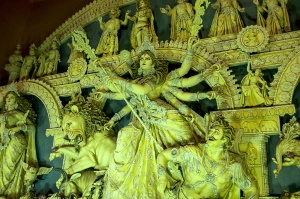 Click here to know more..
Click here to know more..
You do not have to act weird if you have had realization
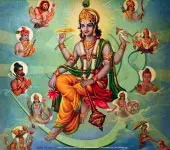 Click here to know more..
Click here to know more..
Kamakshi Dandakam
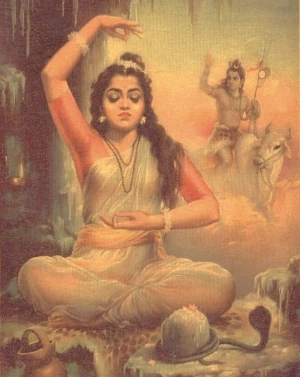
mayaa yatkri'tam te prayachchhaatra saukhyam paratraapi nityam vidhehyanghripadme dri'd'haam bhaktimaaraat namaste shive dehi me mangalam paahi kaamaa....
Click here to know more..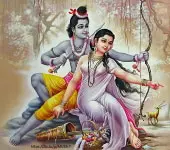
English Topics
Ramayana
Click on any topic to open
- 50 Janaka's Spiritual Evolution - From Jnana to Bhakti
- 49 Dasharatha's Grief Decoded
- 48 Shiva burned Kamadeva at Chhapra, Bihar
- 47 Motherhood brilliance - Kausalya Supraja Rama
- 46 Bala and Atibala Mantras - Sriram Ji will unfold their superpower
- 45 Dasharatha Pleads With Vishwamtra Not To Take Away Young Sriram Ji
- 44 Abandoning Of Sita Devi - Is It Justifiable?
- 43 Vishwamitra Wants To Take Young Sriram Ji With Him
- 42 Position Of Sages In Ancient Bharata
- 41 Horoscope of Sriram Ji
Please wait while the audio list loads..
30
Ganapathy
Shiva
Hanuman
Devi
Vishnu Sahasranama
Mahabharatam
Practical Wisdom
Yoga Vasishta
Vedas
Rituals
Rare Topics
Devi Mahatmyam
Glory of Venkatesha
Shani Mahatmya
Story of Sri Yantra
Rudram Explained
Atharva Sheersha
Sri Suktam
Kathopanishad
Ramayana
Mystique
Mantra Shastra
Bharat Matha
Bhagavatam
Astrology
Temples
Spiritual books
Purana Stories
Festivals
Sages and Saints
